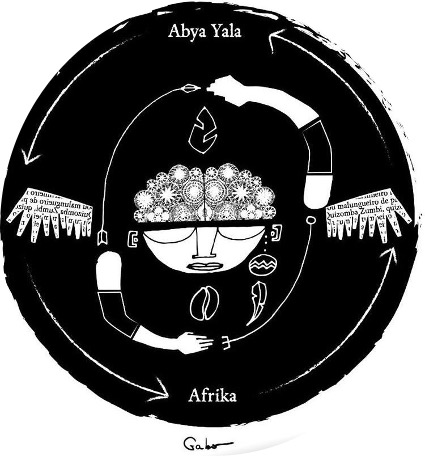RELATOS REAIS, RELATOS SONHADOS:
a marronagem de Juan Francisco Manzano e Maryse Condé
Keywords:
Juan Francisco Manzano, Maryse Condé, Tituba, marronagem cultural, pedagogia da cimarronajeAbstract
This article presents a comparative analysis of A Autobiografia do poeta-escravo, by Juan Francisco Manzano (2015) and Eu, Tituba: Bruxa negra de Salem, by Maryse Condé (2020), evidencing some of the differences and similarities between them since both narratives report the lives of enslaved individuals during the 17th and 18th centuries, in the event of Tituba, and 19th century for Manzano’s. Even though they are distant in time and space, and also considering the fact of Tituba's autobiography being a work of fiction written by Maryse Condé, the authors/narrators demonstrate strategies that coincide with what Depestre (2001) characterized as marronnage cultural, concept also developed by Coelho (2020) under the name of pedagogias da cimarronaje, which notoriously extends to literary writing. Thus, we aim to point to those aspects, common to the Caribbean literatures, seeking a reinterpretation of the History of Black peoples in diaspora in the Americas.
Downloads
References
CASTRO, Alex. Apresentação. In: MANZANO, Juan Francisco. A autobiografia do poeta-escravo. São Paulo: Hedra, 2015.
CAVAGNOLI, Ana Carolina Andrade Pessanha. Descolonizando o eu autobiográfico feminino: a questão da memória e história nas narrativas da escravidão. Entrelaces, v. 1, n. 9, p. 46-61, jun. 2017. Disponível em: http://www.periodicos.ufc.br/entrelaces/article/view/11706. Acesso em: 16 mar. 2021.
CÉSAIRE, Ina. Un avatar historique du conte guadeloupéen : le Récit de Type Nouveau. Cahiers de Littérature Orale: Aux sources des paroles de Guadeloupe, Paris, v. 1, n. 21, p. 97-114, jan. 1987. Disponível em: http://www.potomitan.info/atelier/contes/ina2.php. Acesso em: 28 mar 2021.
COELHO, Rogério Mendes. Pedagogias da cimarronaje: a contribuição das cosmogonias e cosmovisões africanas e afrodescendentes para a crítica literária e literaturas (afro) latino-americanas. 2019. Tese (Doutorado em Letras) – Universidade Federal de Pernambuco, Recife, 2019.
CONDÉ, Maryse. Eu, Tituba: bruxa negra de Salem. Rio de Janeiro: Rosa dos Tempos, 2020. Tradução de Natalia Borges Polesso.
CONDÉ, Maryse. La parole des femmes: Essai sur des romancières des Antilles de langue française. Paris: Éditions l'Harmattan, 1993.
CONFIANT, Raphaël. Traduire la littérature en situation de diglossie. Palimpsestes, [s. l.], ed. 12, 2000. Disponível em: https://journals.openedition.org/palimpsestes/1635#bibliography. Acesso em: 29 out. 2020.
DEPESTRE, René. Bom-dia e adeus à negritude, 2001. Tradução de Maria Nazareth Fonseca e Ivan Cupertino. Disponível em: http://www.ufrgs.br/cdrom/depestre/depestre.pdf. Acesso em: 28 mar. 2021.
EVARISTO, Conceição. Prefácio. In: CONDÉ, Maryse. Eu, Tituba: bruxa negra de Salem. Rio de Janeiro: Rosa dos Tempos, 2020.
GLISSANT, Édouard. Le Discours antillais. Paris: Éditions Gallimard, 1997.
LEJEUNE, Philippe. O pacto autobiográfico: de Rousseau à internet. Belo Horizonte: UFMG, 2008.
LÖWY, Michael. Walter Benjamin: aviso de incêndio. São Paulo: Boitempo, 2005. Tradução de Wanda Nogueira Caldeira Brant, Jeanne Marie Gagnebin e Marcos Lutz Müller.
MANZANO, Juan Francisco. A autobiografia do poeta-escravo. São Paulo: Hedra, 2015. Organização, tradução e notas de Alex Castro.
MOLLOY, Silvia. De la sujeción al sujeto: La "Autobiografía" de Juan Francisco Manzano. In: ______. Acto de presencia: La escritura autobiográfica en Hispanoamérica. Ciudad de México: El Colégio de México, 1996. p. 52-77. Traducción de José Esteban Calderón.
QUIJANO, Aníbal. Colonialidade do poder e classificação social. In: SANTOS, Boaventura de Sousa; MENESES, Maria Paula (Org.). Epistemologias do sul. São Paulo: Cortez, 2010. p. 84-130.
RAMA, Ángel. La ciudad letrada. Montevideo: Arca, 1998.
RAMA, A. Transculturación narrativa en América Latina. México: Siglo XXI, 1982.
SALLES, Ricardo. Prefácio. In: MANZANO, Juan Francisco. A autobiografia do poeta-escravo. São Paulo: Hedra, 2015.
VELASCO, Tiago Monteiro. Escritas de si contemporâneas: uma discussão conceitual. In: CONGRESSO INTERNACIONAL DA ASSOCIAÇÃO BRASILEIRA DE LITERATURA COMPARADA, 14., 2015, Belém. Anais eletrônicos. Belém: Abralic, 2015. p. 1-12. Disponível em: https://abralic.org.br/anais/arquivos/2015_1456108793.pdf. Acesso em: 16 mar. 2021.
Downloads
Published
How to Cite
Issue
Section
License
Copyright (c) 2021 Communitas

This work is licensed under a Creative Commons Attribution-NonCommercial-ShareAlike 4.0 International License.
The Copyright for articles published in this magazine belongs to the author, preserving the rights of first publication for the Communitas Magazine. Because they appear in this publicly accessible journal, the articles are free to use, with their own attributions, in educational and non-commercial applications.
























